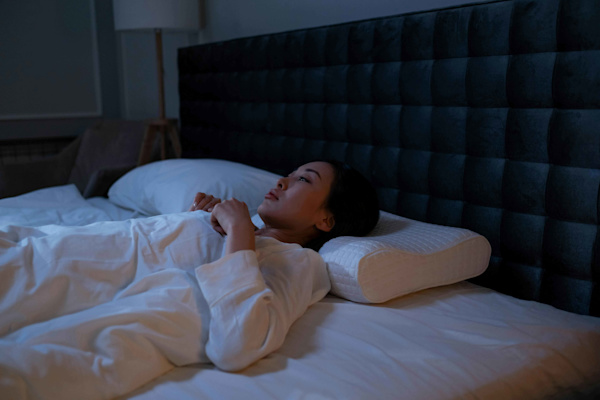
How to fall asleep quickly when your mind is racing
Struggling with a racing mind at bedtime?
Want to discover proven techniques to quiet your thoughts and fall asleep fast. Read on and learn expert tips for better sleep hygiene and conquer insomnia tonight.
We've all been there, lying in bed, eyes wide open, while our minds race through endless thoughts and worries. Unfortunately, once sleep problems begin, very often they can trigger anxiety around the idea of bedtime, making it even more difficult to fall asleep.
This common problem can make falling asleep feel impossible. That’s why understanding HOW to calm a busy mind is essential for achieving a good night's sleep and maintaining healthy sleep habits.
Mudita Harmony 2
Understanding Racing Thoughts
Racing thoughts can be caused by stress, anxiety, or simply an overactive mind processing the day's events. These thoughts can significantly impact your sleep quality, leading to a disrupted sleep cycle and leaving you feeling fatigued the next day. Recognizing the cause is the first step toward finding a solution. Are you worried about something that happened earlier in the day? Are you stressed about an upcoming event or deadline? Once you have identified the cause of your racing thoughts, it will be easier to find ways to calm them down.
Techniques to Calm a Racing Mind
Deep Breathing Exercises Practicing deep breathing can activate your body's relaxation response. Inhale slowly through your nose, allowing your abdomen to expand, then exhale gently through your mouth. This simple technique can promote relaxation, leading to a more restful sleep. In fact, deep breathing has been shown to improve sleep quality. According to published research, there are two main benefits of deep breathing before sleep: calming the central nervous system and aiding mindfulness practice. If you would like to learn more about the benefits of mindful breathing, how, and most importantly WHY it works, be sure to check out our page dedicated to it. Here’s the link: https://mudita.com/resources/health-technology/mindful-breathing
Progressive Muscle Relaxation Progressive muscle relaxation involves tensing and then relaxing each muscle group in your body. Starting from your toes and working up to your head can help reduce physical tension and improve sleep efficiency. Read more about it here: What is progressive muscle relaxation & how to practice it
Mindfulness Meditation Focusing on the present moment without judgment can quiet your mind. Mindfulness meditation has been shown to enhance sleep quality and is a natural sleep aid because of its ability to address the cognitive, emotional, and physiological factors that often contribute to sleep disturbances. This practice involves observing your thoughts and sensations without getting caught up in them, which can help reduce anxiety and racing thoughts that often keep people awake at night. Regular mindfulness practice can also lower cortisol levels, the stress hormone that can interfere with sleep. Additionally, mindfulness can increase melatonin levels, the hormone responsible for regulating sleep-wake cycles. By incorporating even a short daily mindfulness session, preferably in the evening, you can create a calmer mental state conducive to better sleep.
Practice Visualization Techniques Imagine a peaceful scene or a calming experience. Visualization can distract you from intrusive thoughts and guide you toward a sound sleep. This technique involves creating detailed mental images of relaxing environments or scenarios, engaging multiple senses to make the experience more immersive. For example, you might picture a serene beach, hearing the waves, feeling the warmth of the sun, and smelling the salt air. Regular practice of visualization can train your brain to associate these calming images with sleep, making it easier to relax and drift off over time. Additionally, visualization can help reduce anxiety and stress, common culprits behind sleep difficulties.
Creating an Offline Bedtime Routine
An offline bedtime routine can be the best thing to improve sleep hygiene. Establishing a consistent sleep routine signals your body that it's time to wind down. Our brains LOVE routines! They are predictable and comforting, which can help us relax and prepare for sleep. If you don’t have an offline bedtime routine, try creating one that includes activities like meditation, reading or listening to soothing sounds before bed. You might also consider taking a warm bath or shower before getting into bed. Creating an offline bedtime routine is super easy with Mudita Harmony, which comes with a unique Bedtime Reminder that will let you know when you should start getting ready for bed. It also includes a Meditation Timer and a Relaxation Library with custom audio upload.
Consistent Sleep Schedule Go to bed and wake up at the same time every day to regulate your body's internal clock. Yes, this means everyday, even on weekends and during holidays.
Relaxing Activities Before Bed Engage in calming activities like reading, meditation, or taking a warm bath to promote healthy sleep hygiene.
Avoiding Screens and Stimulating Content This is a BIG ONE! We can’t stress it enough. The blue light from screens can interfere with your sleep pattern by suppressing melatonin production, the hormone your brain makes when it’s time for sleep. So, make sure you turn off devices at least an hour before bed.
Environmental Factors
Your bedroom environment plays a crucial role in sleeping well. It should be a sanctuary devoted to sleep.
Optimizing Bedroom Temperature A cool room temperature is conducive to better sleep.
Using Calming Scents Aromatherapy with scents like lavender can enhance sleep health.
Reducing Noise and Light If noise is an issue, use earplugs, or consider a device which plays white noise, like Mudita Harmony. Opt for blackout curtains to keep the light to a minimum and create an environment ideal for restorative sleep.
READ: Simple Ways To Turn Your Bedroom Into A Sleep Sanctuary
Cognitive Strategies
Journaling Before Bed Writing down your thoughts can clear your mind, making it easier to fall asleep quickly. Check out our article on the Benefits of Mindful Journaling.
Scheduled Worry Time If you do have to think over some issues which are going on in your life, set aside time during the day to process worries so they don't intrude at night.
Cognitive Restructuring Techniques Challenge and reframe negative thoughts to reduce anxiety and improve sleep hygiene.
Lifestyle Changes for Better Sleep
Regular Exercise Incorporate physical activity into your routine. However, avoid intense workouts close to bedtime to improve sleep efficiency.
Limiting Caffeine and Alcohol Intake Both can disrupt your sleep cycle. Opt for herbal teas or water in the evening.
Stress Management Techniques Practices like yoga or walking meditation reduce stress levels, promoting a more restful sleep.
When to Seek Professional Help
Sometimes sleep problems are part of a much deeper underlying issue, such as chronic stress, anxiety disorders, depression, or other mental health conditions. These underlying issues can significantly impact sleep patterns and quality, making it essential to address the root cause rather than just treating the symptoms of poor sleep.
If you've tried these strategies and are still struggling with sleep problems, it might be time to consult a professional.
Persistent Insomnia Chronic difficulty sleeping may require medical intervention.
Signs of Anxiety or Depression Mental health conditions can affect sleep quality and should be addressed with a healthcare provider.
READ: How sleep affects mental health
Final Thoughts
Too many of us know the feeling of being unable to sleep due to stress. Achieving a good sleep when your mind is racing is possible with the right techniques and habits.
Experiment with these strategies to discover what works best for you.
At Mudita, we are strong proponents of healthy sleep hygiene. Our mindful alarm clocks, like Mudia Bell and Mudita Harmony are designed to reflect our commitment to better sleep, helping you wake up refreshed and ready to embrace the day.
Related stories

March is Sleep Awareness Month: Time to Reset & Rest
March is Sleep Awareness Month! Learn how sleep impacts health, focus & well-being, and get expert tips to reset your routine for better, healthier rest.

How To Reclaim Your Focus in a World Full of Distractions
Struggling to stay focused in a world of distractions? Learn how to reclaim your attention and focus with mindful strategies and tools like Mudita Kompakt.

How to Sleep Better When Anxiety Keeps You Awake
Struggling to sleep with anxiety? Discover mindful tips, natural remedies & practical strategies to calm your mind, improve sleep quality & wake up refreshed.
If you'd like to receive the best stories from our blog, keep up to date with our progress and get notified about our product releases and special discounts.